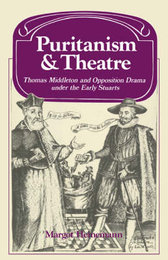
|
Puritanism and Theatre
Paperback / softback
Main Details
| Title |
Puritanism and Theatre
|
| Authors and Contributors |
By (author) Margot Heinemann
|
| Series | Past and Present Publications |
|---|
| Physical Properties |
| Format:Paperback / softback | | Pages:312 | | Dimensions(mm): Height 216,Width 138 |
|
| Category/Genre | History |
|---|
| ISBN/Barcode |
9780521270526
|
| Classifications | Dewey:822.3 |
|---|
| Audience | | Tertiary Education (US: College) | |
|---|
| Illustrations |
Worked examples or Exercises
|
|
Publishing Details |
| Publisher |
Cambridge University Press
|
| Imprint |
Cambridge University Press
|
| Publication Date |
7 October 1982 |
| Publication Country |
United Kingdom
|
Description
The closing of the theatres by Parliament in 1642 is perhaps the best-known fact in the history of English drama. As the Parliamentary Puritans were then in power, it is easy to assume that all opponents of the theatre were Puritans, and that all Puritans were hostile to the drama. The reality was more interesting and more complicated. Margot Heinemann looks at Thomas Middleton's work in relation to the society and social movements of his time, and traces the connections this work may have had with radical, Parliamentarian or Puritan groups or movements. In the light of the recent work of seventeenth-century historians we can no longer see these complex opposition movements as uniformly anti-theatre or anti-dramatist. The book suggests fresh meanings and implications in Middleton's own writings, and helps towards rethinking the place of drama in the changing life of early Stuart England.
Reviews'! a closely-argued, well-written, and meticulously documented book. Its stregths are too many to be properly credited here. Suffice it to say that it will richly repay the attention of anyone interested in Middleton and his period.' Notes and Queries 'Margot Heinemann's study is original in conception and efficiently argued, and its conclusions ! suggest the necessity of modifying views which are still prevalent. The effect of this study on one's view of Middleton is like that of seeing a familiar picture which has been cleaned.' Times Higher Education Supplement '! a most important book ! [It] should transform our appreciation of the greatest dramatist among Shakespeare's successors, thanks to its solid historical foundation ! Puritanism and Theatre will make all who read it seriously rethink the cultural history of early seventeenth-century England.' Christopher Hill, Literature in History
|